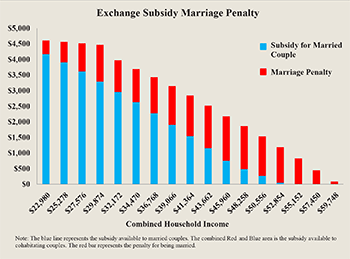Does ObamaCare Discourage Marriage?
< < Go Back
 Just as there are penalties in the tax code for couples who get married, financial penalties in the Patient Protection and Affordable Care Act (ACA) also discourage couples from “tying the knot,” says Devon M. Herrick, a senior fellow with the National Center for Policy Analysis.
Just as there are penalties in the tax code for couples who get married, financial penalties in the Patient Protection and Affordable Care Act (ACA) also discourage couples from “tying the knot,” says Devon M. Herrick, a senior fellow with the National Center for Policy Analysis.
All legal U.S. residents will be allowed to purchase health coverage in the exchange. However, subsidies will only be available to individuals and families with incomes from 100 percent to 400 percent of the federal poverty level — from about $23,550 to more than $94,200 for a family of four.
The exchange subsidies are rather generous to low-income individuals. However, the exchange subsidies are more generous to unmarried couples than to couples who marry.
Consider the case of two unmarried college students each earning about $23,000 annually, who move in together. If that same couple married, their combined household income of nearly $46,000 would rise as a percent of the poverty level from 200 percent (individually) to 296 percent for a married family of two. As a result, their premiums in the health insurance exchange would be capped at a higher percentage of their income, providing a smaller total subsidy.
– Individually they would each qualify for a subsidy of about $1,087, or $2,174 per household.
– If that same couple were to marry, their subsidy would fall to $753.
– Thus, their marriage penalty is $1,421.
– The exchange marriage penalty is especially pronounced for couples in moderate-income households with an income of $30,000 to $55,000 annually.
The structure of the exchange subsidies creates perverse disincentives to family formation that add to the existing marriage penalty in the tax law. As a result of these penalties, many moderate-income couples could decide marriage is a luxury they cannot afford.
More From NCPA:



